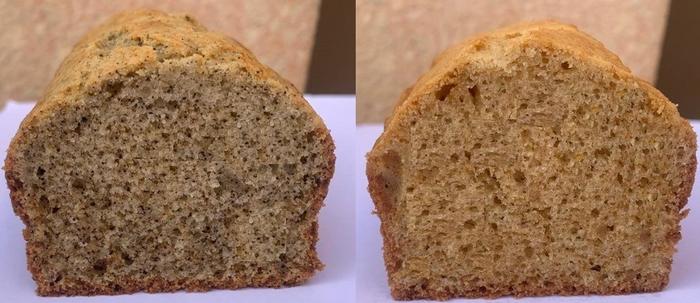On a crisp fall afternoon, there are few pairings better than a hot beverage and a sweet pastry. But what if you could use the left-over tea leaves or coffee grounds from the drink to make that tasty treat a healthier one, too? Researchers reporting in ACS Omega have done just that by incorporating spent tea or coffee powders into sponge cake batters to make a more nutritious and longer-lasting snack.

Credit: Mohamed Mahmoud
On a crisp fall afternoon, there are few pairings better than a hot beverage and a sweet pastry. But what if you could use the left-over tea leaves or coffee grounds from the drink to make that tasty treat a healthier one, too? Researchers reporting in ACS Omega have done just that by incorporating spent tea or coffee powders into sponge cake batters to make a more nutritious and longer-lasting snack.
Tea and coffee are among the most-consumed beverages in the world — second only to water. In addition to providing caffeine, both are rich in bioactive substances, including antioxidants, fiber and important nutrients, including potassium and calcium. But during the process of preparing the drinks, many of these compounds are left behind, either in coffee grounds or tea leaves. Spent tea or coffee has been added to animal feeds and agricultural compost in the past, but few researchers have looked at incorporating these wastes into foods to fortify them for human consumption. So, Abdelrahman Ahmed, Khaled Ramadan, Mohamed Mahmoud and colleagues wanted to include spent tea and coffee powders in sponge cakes, as well as explore their nutritional and sensory properties and shelf lives.
To create the powders, the team brewed either black tea or Arabica coffee, then thoroughly rinsed, dried and pulverized the leftover grounds or leaves. These were then added into the flour used for sponge cake batter in different amounts, creating loaves with either 1%, 2% or 3% powder. This material gave the cakes a higher antioxidant activity and increased concentrations of important nutrients compared to control ones made with only regular flour. However, a sensory panel rated loaves with higher amounts of spent tea powder with lower sensory properties, largely because of their darkened appearance. Cakes with spent coffee powder were scored more similarly to the control loaves in terms of appearance, taste and texture. Additionally, the fortified cakes were slightly more shelf stable, and had less microbial growth after up to 14 days of storage. The researchers say that this work could help provide new pathways to recycle an otherwise wasted product and improve the nutritional value of foods.
The authors acknowledge funding from the Deputyship for Research and Innovation of the Saudi Arabia Ministry of Education.
The American Chemical Society (ACS) is a nonprofit organization chartered by the U.S. Congress. ACS’ mission is to advance the broader chemistry enterprise and its practitioners for the benefit of Earth and all its people. The Society is a global leader in promoting excellence in science education and providing access to chemistry-related information and research through its multiple research solutions, peer-reviewed journals, scientific conferences, eBooks and weekly news periodical Chemical & Engineering News. ACS journals are among the most cited, most trusted and most read within the scientific literature; however, ACS itself does not conduct chemical research. As a leader in scientific information solutions, its CAS division partners with global innovators to accelerate breakthroughs by curating, connecting and analyzing the world’s scientific knowledge. ACS’ main offices are in Washington, D.C., and Columbus, Ohio.
To automatically receive news releases from the American Chemical Society, contact [email protected].
Follow us: Twitter | Facebook | LinkedIn | Instagram
Journal
ACS Omega
DOI
10.1021/acsomega.3c03747
Article Title
The Bioactive Substances in Spent Black Tea and Arabic Coffee Could Improve the Nutritional Value and Extend the Shelf Life of Sponge Cake after Fortification
Article Publication Date
11-Sep-2023




